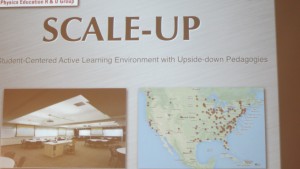This year I attended a Canadian Association of Physicists (CAP) Congress in Edmonton. The meeting made me think once again about the importance of science communication. For example, I attended a number of plenaries and invited talks and some of them were very exciting. For example, Sara Seager from MIT gave a great talk about exo-planets and Miguel Alqubierre from Mexico gave a great public talk about relativity. It was clear these speakers came to share their research and their excitement about their research with the general public and with the fellow scientists. The same can be said abut Bob Biechner from North Carolina who gave a great talk about SCALE-UP – studio-based physics in Carolina State University in Raleigh, North Carolina. However, a number of other talks were extremely disappointing. It was stunning to see how people who receive very prestigious awards for their research achievements come giving a very specialized talk to a very general audience without paying attention to the audience’s interest or even ability to understand their research and why it is important. I realize that being a researcher and being a great speaker is absolutely not the same thing and I cannot expect every scientist to be Richard Feynman, Eric Mazur or Erik Vogt, but should they at least care a little bit if their research can be understood by the people outside of their very narrow field? I was wondering why are we so snobbish about scientists who spend some of their precious time communicating science to the general public? What if we didn’t have Carl Sagan, Michio Kaku, or Richard Dawkins – how many people would have not been excited about science then? How can we expect to be funded if we even cannot communicate to our colleagues? The more I am thinking about it, the more I think communication should be a part of the graduate and undergraduate education. Public speaking should be a must, Power Point design should be a must (I cannot even count how many absolutely appalling slides I saw in my life in academia), an ability to prepare a talk in your field that can be understood and appreciated by the people outside of your sub-field is a must. And of course the use of acronyms is just a joke. Some talks (especially particle physics ones) included acronyms used as axes definitions without even telling us what they meant… On the other hand, Bob Beichner started his talk with the explanation of where his acronym for studio-based physics – SCALE-UP came about.

I love physics and it hurts me to think how we undervalue professional communication. Going to a yearly Congress of the Canadian Association of Physicists should be an exciting experience where we learn not only what is in our field, but also learn new physics outside of our field of interest. This is how we keep up to date and how we generate new ideas. And having people giving talks that very few can understand is very disappointing. I know that both by husband and I are working to become good speakers. We listen to teach other, provide feedback and are trying to improve. We care about our audience and I hope one day when we are asked to give an invited or a plenary talk we will do a good job of that. Because we love physics and we want people who listen to our talks to know why we feel like that…
